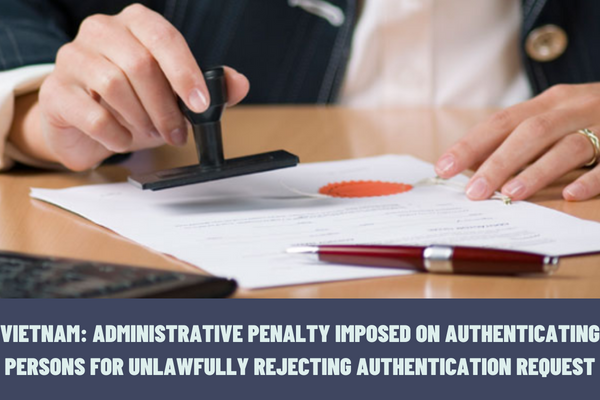What is the administrative penalty imposed on authenticating persons for unlawfully rejecting a request for authentication of a copy from an original?
- Do authenticating persons have the right to reject a request to authenticate a copy from the original?
- What is the administrative penalty imposed on authenticating persons for unlawfully rejecting a request for authentication of a copy from an original?
- Which agency has the authority to authenticate copies from originals?
Do authenticating persons have the right to reject a request to authenticate a copy from the original?
According to Article 9 of Decree No. 23/2015/ND-CP stipulating the obligations and rights of authenticating persons in Vietnam as follows:
Rights and obligations of authenticating persons in Vietnam
1. Ensure honesty, accuracy and objectivity when authentication is carried out;
2. Take legal responsibility for one’s own authentication;
3. Do not authenticate contracts or signatures concerning properties or interests of their own or of their relatives (spouses, biological and adoptive parents, biological and adopted children...)
4. Reject authentication in cases as defined in Articles 22, 25 and 32 hereof;
5. Request relevant agencies, organizations, and individuals to provide necessary information to verify legality of the papers and documents submitted for authentication.
6. Document, impound and transfer to competent state agencies for handling any paper or document (submitted for authentication) that is illegally issued, falsified or contain information as defined in Clause 4, Article 22 hereof.
7. Instruct requesters to make supplements to the papers or documents (submitted for authentication) if necessary or instruct them to make submission to the right competent agency upon finding they go to the wrong place.
In case of rejection, authenticating persons must give proper reasons in writing to the requester.
Thus, according to regulations, authenticating persons are entitled to reject authentication in the cases specified in Articles 22, 25 and 32 of this Decree. In case of rejection, authenticating persons must give proper reasons in writing to the requester.
What is the administrative penalty imposed on authenticating persons for unlawfully rejecting a request for authentication of a copy from an original? (Image from the Internet)
What is the administrative penalty imposed on authenticating persons for unlawfully rejecting a request for authentication of a copy from an original?
According to Clause 2, Article 34 of Decree No. 82/2020/ND-CP, violations against regulations on authentication of copies from originals and authentication of signatures are prescribed as follows:
Violations against regulations on authentication of copies from originals, authentication of signatures
...
2. A fine of between VND 3,000,000 and VND 5,000,000 shall be imposed for one of the following acts:
a) Forging the signature of authenticating persons;
b) Failure to comply with the request for authentication within the prescribed time limit;
c) Authentication outside the head office of the authentication organization, unless otherwise provided for by law;
d) Unlawfully rejecting authentication requests;
dd) Failure to arrange a person to receive authentication request on working days of the week; failing to publicly post up the working schedule, authority, procedures, settlement time, fees and expenses for authentication at the head office of the authentication organization;
e) Failure to write or not specifying the location of authentication; perform authentication outside the head office without specifying the time (hour, minute) of authentication;
g) Writing testimonies not according to the form prescribed by law;
h) Making, managing and using authentication books in contravention of law.
Thus, according to regulations, an authenticating person who unlawfully rejects to request authentication may be subject to an administrative fine of up to VND 5,000,000.
The above fine is imposed on individuals, the fine imposed on organizations is 2 times higher than that of individuals.
Which agency has the authority to authenticate copies from originals?
According to Article 5 of Decree No. 23/2015/ND-CP, the authorities and responsibilities for authentication are as follows:
Authorities and responsibilities for authentication
1. The Justice offices of provincial-affiliated districts and cities (hereinafter referred to as the Justice Office) shall:
a) Certify true copies from originals of papers, documents issued or certified by Vietnamese competent authorities, foreign competent authorities, or Vietnamese competent authorities in association with foreign competent authorities.
…
2. People’s Committees of communes (hereinafter referred to as the People’s Committee of communes) shall:
a) Certify true copies from originals of any paper, document issued or certified by Vietnamese competent authorities;
…
3. Diplomatic missions, consulate representative agencies and other agencies authorized to act as consuls in foreign countries (hereinafter referred to as the representative agency) have authorities and responsibilities for authenticating the matters as defined in Points a, b and c of this Clause. Diplomats, consuls shall carry out authentication, sign names and affix seals;
4. Notaries have authorities and responsibilities for authenticating the matters as defined in Points a, Clause 1, Point b, Clause 2 of this Article, signing names and affixing seals of the Notary Office.
...
Thus, the agencies has the authority to authenticate copies from originals, including:
- The Justice offices of provincial-affiliated districts and cities (hereinafter referred to as the Justice Office)
- People’s Committees of communes (hereinafter referred to as the People’s Committee of communes)
- Diplomatic missions, consulate representative agencies and other agencies authorized to act as consuls in foreign countries (hereinafter referred to as the representative agency)
- Notary bureaus, notary offices (hereinafter referred to as notarial practice organizations).
LawNet